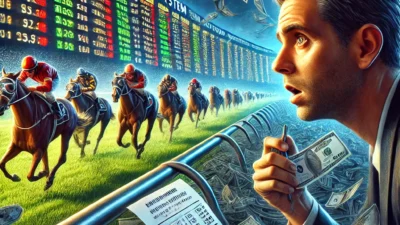The favorite-longshot bias in sports betting, where bettors tend to underbet favorites and overbet longshots, has been a prominent subject of research. Two main explanations for this bias have emerged: the tendency of bettors to exhibit risk-loving behavior, and the misperception of probabilities, with recent evidence supporting the latter and aligning with Prospect Theory (Snowberg & Wolfers, 2007; Nutaro, 2023). This bias is observed across various sports, including horse racing and baseball, where longshots are often overvalued and favored bets are underestimated (Newall & Cortis, 2021; Nutaro, 2023).
One key psychological factor contributing to the favorite-longshot bias is overconfidence. Bettors often overvalue their bets and are overly optimistic about their chances of winning, even when probabilities suggest otherwise. This overconfidence can skew betting behavior and lead to significant financial losses for gamblers, as they misjudge the expected outcomes of their bets (Chegere et al., 2022). Overconfidence is closely tied to the gambler’s desire to achieve high rewards, especially in the case of longshots, which may promise higher returns despite lower probabilities of success.
Several factors influence the magnitude of the favorite-longshot bias, including bet sizes and the number of potential outcomes in a given market. For instance, markets with many possible outcomes (such as those in horse racing) may amplify the bias, as bettors seek to bet on less likely events in the hope of achieving large payouts (Feess et al., 2016; Newall & Cortis, 2021).
Interestingly, people tend to overestimate the emotional impact of losses, as they underestimate their ability to rationalize them (Kermer et al., 2006).
Understanding the favorite-longshot bias is crucial, as it has important implications for the efficiency of betting markets. It can distort the betting behavior of participants and lead to inefficiencies, particularly in parimutuel betting markets where the distribution of winnings is determined by the pool of bettors’ wagers (Ottaviani & Sørensen, 2009). By recognizing and addressing this bias, bettors may be able to make more informed decisions, reducing the potential for losses and improving market efficiency.
Bettors often overvalue their bets and are overly optimistic about their chances of winning, even when probabilities suggest otherwise. This overconfidence can skew betting behavior and lead to significant financial losses for gamblers, as they misjudge the expected outcomes of their bets
Summary of: Chegere Et Al 2022
Anecdote
Have a story to share? Write to us at research@bettingresearch.org if you have a related, personal experience you would like to see placed here and share with the community.
Articles Cited
- “Kedi Peng (2025): The Impact of Loss Aversion on Decision-Making in Marketing and Financial Markets, https://doi.org/10.54254/2754-1169/2024.19247
- The paper investigates the impact of loss aversion, a prominent psychological bias, on decision-making processes in marketing and financial markets, and explores coping strategies to mitigate its negative effects.”
- “Zhuoyan Du (2024): Loss Aversion: Exploring the Influence of the Cognitive Bias on Decision-Making, https://doi.org/10.54254/2754-1169/60/20231227
- This paper discusses the concept of loss aversion and explores how it influences decision-making in various contexts, such as the Counter-Strike skin market, gambling, and the stock market, and presents experimental evidence to support the effects of loss aversion on decision-making.”
- “R. Pedace, Janet Kiholm Smith (2012): Loss Aversion and Managerial Decisions: Evidence from Major League Baseball, https://doi.org/10.1111/j.1465-7295.2012.00463.x
- The paper examines the role of loss aversion in managerial decision-making, finding that new managers in Major League Baseball are more likely to divest low-performing players, especially when the low-performing player was acquired by the previous manager.”
- “Kenneth A. Froot, J. Arabadjis, Sonya Cates, Stephen Lawrence (2011): Evidence on Dynamic Loss Aversion from Currency Portfolios, https://doi.org/10.3905/jpm.2011.38.1.060
- Currency investors exhibit dynamic loss aversion, cutting risk after losses and adding risk after gains, with losses in one currency impacting trading in another, though the effect declines after a losing position is closed.”
- “D. A. Kermer, Erin Driver-Linn, Timothy D. Wilson, D. Gilbert (2006): Loss Aversion Is an Affective Forecasting Error, https://doi.org/10.1111/j.1467-9280.2006.01760.x
- People overestimate the emotional impact of losses compared to gains of equal magnitude, because they underestimate their tendency to rationalize losses and overestimate their tendency to dwell on losses.”
- “Jinpyo Lee (2019): Impact of Loss-Aversion on a Financially-Constrained Supply Chain, https://doi.org/10.3390/SU11092680
- The paper develops a model to analyze the impact of loss-averse behavior of the bank and supplier on the optimal operational decisions in a financially constrained supply chain.”
- “Stephen G. Dimmock, Roy Kouwenberg (2009): Loss-Aversion and Household Portfolio Choice, https://doi.org/10.2139/ssrn.680783
- The paper examines how loss-aversion affects household portfolio choice, finding that higher loss-aversion is associated with lower equity market participation and a greater avoidance of direct stockholding compared to mutual funds, but does not significantly affect portfolio allocations to equity after controlling for sample selection.”
- “Corina Paraschiv, Olivier L’Haridon (2008): Loss Aversion: Origin, Components and Marketing Implications, https://doi.org/10.1177/205157070802300204
- The paper reviews the existing marketing literature on loss aversion, distinguishes four dimensions of loss aversion, identifies moderators of loss aversion, and provides strategic recommendations for marketers based on consumer loss aversion.”
Insufficient Detail?
At times it is difficult to answer the question as there are not enough relevant published journal articles to relate. It could be that the topic is niche, there’s a significant edge (and researchers prefer not to publish), there is no edge or simply no one has thought to investigate.



